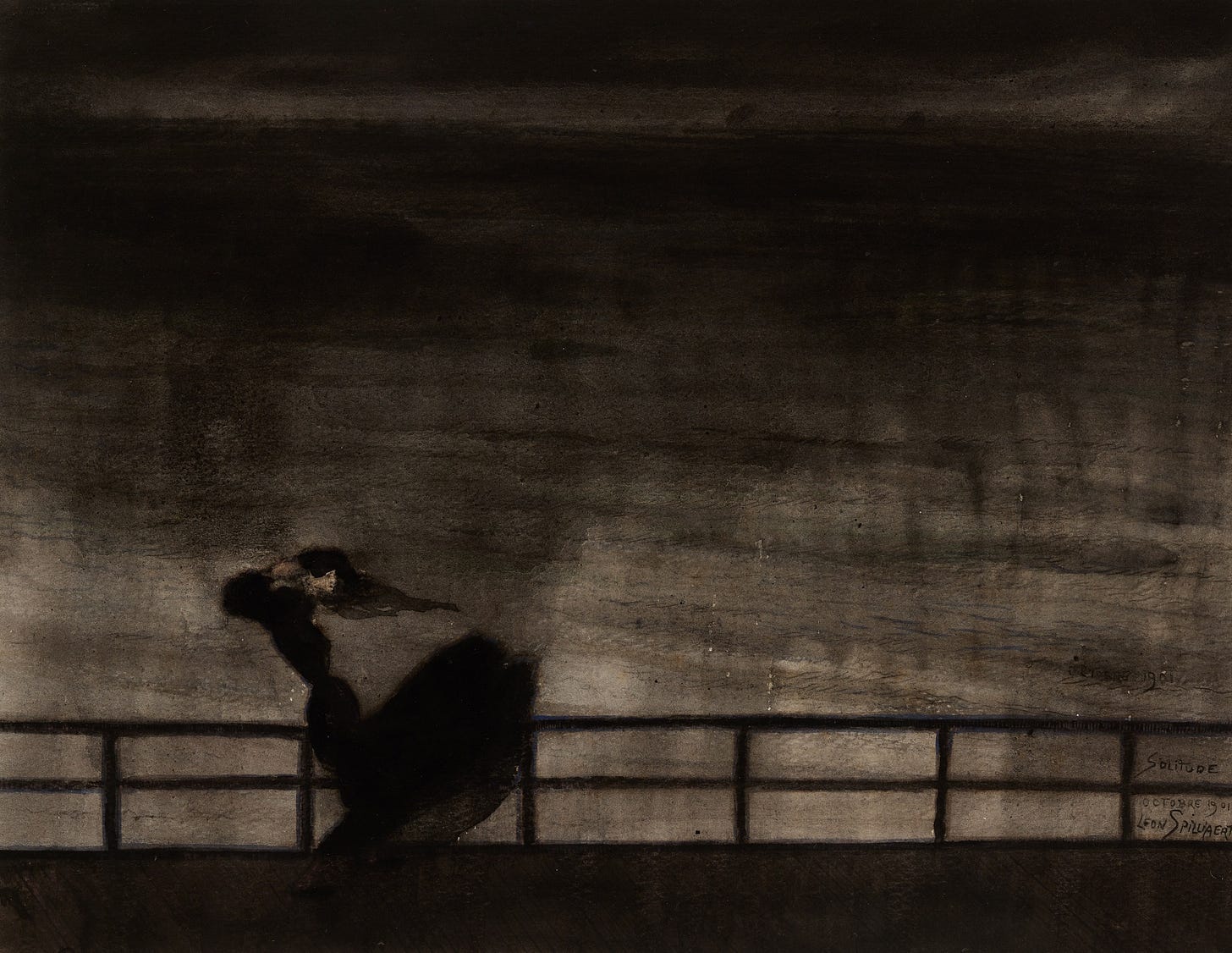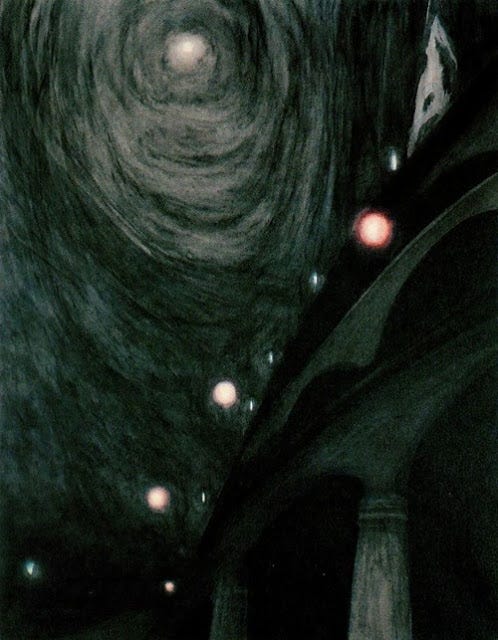Note: The following story may be disturbing.
The day my mother killed herself began with a revelation. The aliens came in black ships, black in the truest sense of the word, absorbing all radiation. We didn’t even notice them before receiving their transmission.
“WE MEET ONE-ON-ONE,” it read, followed by a diagram showing their massive ship beside the International Space Station. The imperfect English comforted me. While the technology of these aliens seemed far beyond us, they were clearly not gods.
Later that day it was announced that humanity (or at least the United States presumptively speaking on behalf of humanity) accepted, and the first human to make contact with extraterrestrial life would be Ryan Samson, my younger brother.
It felt meant to be. As an eight-year-old, Ryan told me he would be an astronaut— not with the enthusiasm of a kid speaking of a fanciful dream, but with a sense of finality as if talking about the sunrise tomorrow, just another future event. He was always like that: he didn’t talk much, and when he did it was with a deliberate sincerity. If I asked him, “How was your day?”, he would pause, really think about it for a few seconds. His answer was usually uninspired: “Good”, “Fine”, “Okay”. But his tone always seemed to suggest that he was revealing some hidden truth about the world. It was obnoxious. We didn’t get along too well as children.
It wasn’t that he was some kind of super-genius; hell, I was probably a better student than him, but he was ambitious. It wasn’t a loud ambition; he wasn’t boastful or proud and tended to fade into the background of any room he was in. But he was tenacious and dedicated, with a certain way of speaking that caused people to obey, then only question his words afterwards.
So despite him being the youngest person aboard the ISS, I wasn’t surprised that he somehow became our spokesperson. Because, while it was often hard to tell what Ryan wanted in life, I knew he would want this. And he was really good at getting what he wanted.
Hours later, I sat down on the couch with our mother preparing to watch the most important meeting in humanity’s history. We watched as Ryan walked onto the alien ship, its rotation simulating gravity equal to Earth’s. The world could hear his breaths and see in high definition the alien across the way mimicking his human form.
The pageantry on screen became horror in mere moments. I felt myself beginning to vomit as my mother hurried from the room muttering something like notmybabynotmybabynot… Then, just seconds later, I heard the gunshot.
Three Days Later
I followed two guards through nondescript corridors lit by bright fluorescent lights. Empty rooms with endlessly increasing numbers devoid of any semblance of purpose passed us by on either side. Eventually we entered a somehow even more brightly lit hallway where two men, likely Secret Service, stood guard to a hospital room. There, lying on the bed, covered by a full-body cast hiding his torn muscles and broken bones, with bloodshot eyes and strangle marks on his neck, lay my brother Ryan.
Ryan spoke, his voice just as I remembered it, slow and deliberate with an air of authority. A once calming voice, which now just felt unsettling.
“You remember the deal. I talk to my sister alone. I know you’re going to be recording everything anyways.” The men gave me a questioning glance, but my nod reassured them that they were free to leave.
He nodded towards me, “Hey, Em. Good to see you. How’s your research going?”
I had to suppress the perfunctory response. “Ryan, you know why I’m here. What the fuck happened up there?”
“You saw the video, same as everyone else. You know what happened,” he replied.
I wondered if he had heard about Mom.
“I know my brother… it wasn’t like you. Ryan… please… they’re going to have you killed,” I begged. “Tell me what the fuck happened up there.”
He paused and attempted a deep breath, but he ended up choking on the air and began coughing instead. There was blood.
“…fucking pathetic, can’t even fucking breathe properly anymore,” I heard him mutter under his breath. Undeterred, he took a successful deep breath and began to speak:
“Have you ever had a dream where you realize the rules of reality aren’t what they should be? You don’t notice it’s a dream, but nevertheless you know that something is wrong. It was sort of like that.”
“Imagine you walk into a room with gray walls. You know they are gray. They have to be gray. But in their place is a purple ocean of unnaturally square waves that roll into a depthless void. Within each breaking wave another one builds perpendicular to it, and focusing on them reveals a fractal-like complexity and causes a building headache. The void moves with your vision, a black spot slightly left of center, and as you turn your head the direction of the waves shifts accordingly.”
“You begin to feel intense pain in body parts that you never knew existed and hear sounds so complex and disturbing that it is hard to imagine they could’ve been manufactured in the physical world. The room feels hot and cold, as if you have been set aflame and thrown into freezing water. The floor is liquid and you have no sense of proprioception as you stumble and fall over. You feel a nausea, all-encompassing, which makes you want to rip out your fingernails for the faint hope of feeling anything else.”
“Your perception only harmonizes with one person across the room; they are a buoy of tranquility in a sea of agony. The alien has your face and body. Your Face. Your Body. Expressionless, he mocks you. Focusing on him—it—brings order to a senseless world and all the chaos fades to the background.”
He paused for a moment to catch his breath. He was angry, the first time I could remember seeing him so. He closed his eyes, took a few ragged breaths, and continued. When he spoke again, he did so more slowly, reverent and wistful, as if reminiscing about a long-lost first love.
“What happened next was inevitable; it was reflex and desire. My body was my own, in a way it had never been before. And seeing the alien ahead of me—my only anchor to reality—my body screamed with desire. I felt the twitch of anticipation in each muscle fiber desperate to tear itself apart in the service of a greater purpose, the overwhelming desire of each tooth to lodge itself in uncannily familiar flesh, the need of each finger to push into the wet folds of the alien’s brain.”
“I sprang forward with an unnatural agility, screaming with the ecstatic pain of torn muscles and broken bones. The thing stood there uncomprehending—too stunned to feel fear, but faintly quivering nonetheless. I was on it in an instant. My fingers bored directly into its eyes, the resistance less than I expected. Though it appeared to wear my human skin, its flesh was weak and supple. I shattered its skull on the ground and bit into the flesh of its arm. It tasted wonderful.”
He stopped there. He may have noticed my expression as my horror grew alongside his excitement.
"Well, I should probably stop there. You’ve seen the video; you know what happens next. There are some things that are better left unsaid. I’ve probably already said too much. I know how I must seem from the outside.”
I should probably have said something, but I couldn’t find the words. I mean, what could you say to that? Any attempt at consolation or admonition just felt hollow. So I just let him continue.
“You have to understand what it feels like. To be alive, and then to have it all taken away. Forced back into a life without perception,” he lamented. “You see these marks here?”, he asked, gesturing at the finger marks on his neck. “When I first woke up I tried to strangle myself. They didn’t even need to stop me, fucking pathetic, I don’t have control of my body anymore. On that day, I could’ve stopped my heartbeat with a thought. Now I’m just trapped in a prison of meat.”
“The dullness of the world is overwhelming. I remember what it was like to see, to hear, to feel. It’s a bit more manageable now that the painkillers have worn off, but it’s still no more than vague impressions felt through layers of cognitive regurgitation.”
“Can you at least tell me that you had no choice in the matter, that you wouldn’t do it again?” I pleaded.
“It’s hard to say. It was inevitable, but at the same time it feels like the only real choice I ever made, my only action of any consequence. I wish I could say that I wanted to move on and forget, put it behind me, and somehow return to my life as it was. But I would be lying. When I fall asleep, I just dream of that day, of being alive. It’s the only thing keeping me going. I appreciate you Em, but I’m beyond hope. I would kill you if it meant a chance to experience it again.”
He looked past me, eyes unfocused, as if floating in a dream. After a moment, he seemed to return to reality with newfound clarity.
“They’re going to kill me, aren’t they?”
“Probably.” I paused for a moment. “Yeah. Yeah, I think they will.”
“Can you do me a favor? Make sure it’s a slow death. I want to feel something at the end.”
“I’ll give it a shot. Goodbye, Ryan.” I moved to give him a hug, but I couldn’t bring myself to do it. Instead I just awkwardly stood by the bed for a few seconds before nodding to him and leaving.
The Next Day
The world moved on with surprising ease. The aliens left before anyone could really internalize their arrival. Sure, there were protests and riots, but most of those had to do with Ryan and would subside after the execution today. People seemed to generally fall into two camps. Some people viewed Ryan as a traitor who had made future alien retribution inevitable, a monster who needed to die. Others viewed him as a savior who staved off an extraterrestrial colonization, but nonetheless a monster who needed to die. There wasn’t much disagreement on the dying point.
I was able to watch the execution in person. His wife, who he hadn’t talked to since returning—probably a wise decision—was the only other person in attendance.
It was a lethal injection with no paralytic or painkiller, and as he spasmed in pain, I swear I saw a faint smile tug at the corners of his lips.
Gordon Anderson is a co-editor of Synthesized Sunsets. He spends much of his time reading, listening to music, and walking, or occasionally all three at the same time.










